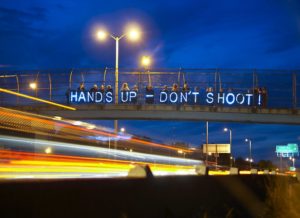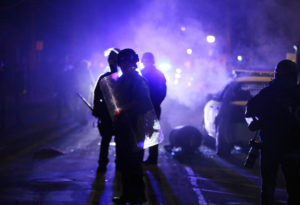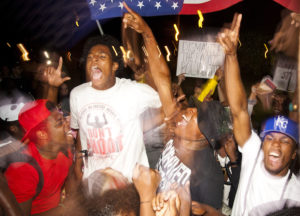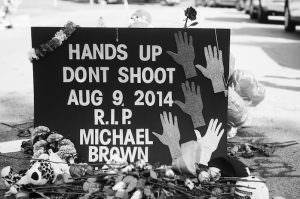Ferguson Prosecutor Robert McCulloch’s Contempt for a Community
The name Ferguson should become shorthand for dehumanization. Gerry Lauzon (CC-BY)
Gerry Lauzon (CC-BY)
The name Ferguson should become shorthand for dehumanization.
No one should have been surprised that police officer Darren Wilson was not charged in the killing of 18-year-old Michael Brown. I’ve written before, and likely will have to write again, about the tragically low value our society places on the lives of young black men. Prosecuting Attorney Robert McCulloch led the grand jury in a manner that seemed designed to indict the unarmed Brown rather than the man who shot him dead. The outcome was not in suspense.
So what happened on the outskirts of St. Louis is a familiar story. But rarely have we been able to see so clearly how authorities, at virtually all levels, can write off an entire community as alien and apart.
This was apparent from the beginning. On Aug. 9, Wilson was in his patrol car when he saw Brown and Dorian Johnson walking in the street. Wilson’s account of what he said to them — “Why don’t you guys walk on the sidewalk?” — went unchallenged at the grand jury hearing. In context, Johnson’s version of what Wilson said sounds more credible to me: “Get the [expletive] on the sidewalk.”
Whatever words were spoken, a struggle between Wilson and Brown ensued, with Wilson still inside the car. At one point, Wilson said he tried to hold Brown’s arm. “The only way I can describe it is I felt like a 5-year-old holding on to Hulk Hogan. … That’s just how big he felt and how small I felt just from grasping his arm,” Wilson testified. At another point in the encounter, Wilson said, Brown looked like a “demon.”
Brown was about 6-feet-4 and weighed nearly 300 pounds — a large man, to be sure, but human, not demonic. Wilson is also about 6-feet-4 and reportedly weighs 210. I’m not aware of many 5-year-olds that size.
Wilson described a fight through the car window in which he was punched twice in the face. Grand jurors examined photographs of Wilson taken later at a hospital, and transcripts show they had difficulty making out the facial bruises and swelling he reported suffering. No matter; the prosecutor seemed satisfied that Wilson had come up against a hulking giant who, though unarmed, posed a mortal threat.
In the disturbances that closely followed Brown’s death, police responded with tear gas, armored vehicles and an array of military-style equipment more suitable for crowd control in a war zone than in an American suburb. This made sense only if Ferguson was seen not as a community to be policed but as a place to be contained and controlled.
Citizens — because that’s what the people of Ferguson are, not subjects — reacted with anger. Officials promised afterward that they had learned a lesson and would not repeat the mistake. Instead, they made new ones.
The way McCulloch conducted the grand jury probe was anything but ordinary. Evidence is usually presented in the light most favorable to the prosecution; the idea is to seek an indictment and then figure out guilt or innocence later at trial. McCulloch presented both sides of the case in great detail, essentially asking grand jurors — not trial jurors — to be adjudicators of the facts. He put Brown on trial, not Wilson.
In his rambling, self-justifying news conference announcing the no-indictment decision, McCulloch made clear that he believed the eyewitnesses who supported Wilson’s version of events and disbelieved those who did not. Moreover, he questioned the motives of those who disputed Wilson’s story, as if they could not be relied on to participate in an honest search for the truth.
Wilson had nearly four hours to tell his story to the grand jury. Would his account have withstood vigorous cross-examination? Would he even have taken the stand at a trial? We will never know.
Gov. Jay Nixon made a great show beforehand of declaring a state of emergency that would allow him to call in greater resources to guarantee public safety. Both the in-your-face tone and bizarre timing of McCulloch’s announcement — what court does business at 8 p.m.? — were needlessly provocative. Police were deployed in a way that seemed more suited to containing a riot rather than preventing one.
By no means would I ever seek to excuse the arson, looting and senseless destruction that took place Monday night. But policing is something that should be done with a community, not to it. Officials were treating the people of Ferguson like a rabble long before the first police car was torched.
Eugene Robinson’s e-mail address is eugenerobinson(at)washpost.com.
© 2014, Washington Post Writers Group
Your support matters…Independent journalism is under threat and overshadowed by heavily funded mainstream media.
You can help level the playing field. Become a member.
Your tax-deductible contribution keeps us digging beneath the headlines to give you thought-provoking, investigative reporting and analysis that unearths what's really happening- without compromise.
Give today to support our courageous, independent journalists.






You need to be a supporter to comment.
There are currently no responses to this article.
Be the first to respond.